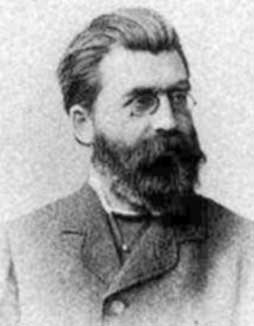


 تاريخ الرياضيات
تاريخ الرياضيات
 الرياضيات في الحضارات المختلفة
الرياضيات في الحضارات المختلفة 
 الرياضيات المتقطعة
الرياضيات المتقطعة
 الجبر
الجبر
 الهندسة
الهندسة 
 المعادلات التفاضلية و التكاملية
المعادلات التفاضلية و التكاملية 
 التحليل
التحليل
 علماء الرياضيات
علماء الرياضيات |
Read More
Date: 24-1-2017
Date: 5-2-2017
Date: 18-1-2017
|
Born: 30 June 1848 in Halle, Germany
Died: 13 May 1919 in Giessen, Germany

Eugen Netto's father was Heinrich Netto, an official at the Franckesche Stiftung at Halle. The Stiftung was a Protestant religious institute which included a school for the poor, an orphanage, a medical centre, and publishing house. Eugen's mother was Sophie Neumann. Up to the age of ten Eugen attended a school in Halle, but from that time he went to a Gymnasium in Berlin.
Netto was fortunate to have an outstanding teacher of mathematics at the Berlin Gymnasium in Karl Heinrich Schellbach, who had been Eisenstein's mathematics teacher. It was Schellbach who showed Netto the excitment of mathematics and from that time on mathematics was clearly the only topic that he considered. After graduating from the Gymnasium in 1866, Netto entered the University of Berlin to study mathematics. He again had some inspiring teachers in Kronecker, Weierstrass and Kummer.
Netto graduated from Berlin in 1870 having worked specifically under Weierstrass and Kummer. It was in fact Weierstrass who examined his final dissertation. There was no immediate university appointment for Netto, however, and he taught in a Gymnasium in Berlin for nine years before being appointed as extraordinary professor at the University of Strasbourg in 1879.
It was the French-German war of 1870-71, which ended with Alsace being annexed by the German empire, which had led to a German university being set up in Strasbourg. In 1872 the so-called Kaiser-Wilhelms-Universität was opened in Strasbourg. The Mathematisches Seminar there was directed by Christoffel and Reye, and Netto took part in this seminar. His involvement is described in [6] where interesting background information about the working conditions and the number of students is given.
After three years at the University of Strasbourg Weierstrass recommended that Netto be appointed an extraordinary professor at the University of Berlin and he took up the appointment in 1882. There he taught courses on advanced algebra, the calculus of variations, mechanics, Fourier series, and synthetic geometry. Netto held this post in Berlin until 1888 when he was appointed ordinary professor at the University of Giessen. He held this post for twenty-five years until his retirement in 1913.
In 1878 he attempted the second general proof of the invariance of 'dimension' but, like the first by Thomae, it was not completely satisfactory. Despite this, Netto's "proof" was widely accepted as providing a solution to the dimension problem until Jurgens' criticism in 1899 of Netto's proof. Jurgens similarly criticised a proof of the invariance of 'dimension' which had been given by Cantor. These events are fully described in [4].
Cantor showed in 1878 that the unit interval I can be mapped bijectively onto the unit square I2. In the following year Netto showed that such a mapping cannot be a continuous function. These results by Cantor and Netto are starting points for the investigations of space-filling curves which are an active research area today.
Netto made major steps towards abstract group theory when he combined permutation group results and groups in number theory. He did not however include matrix groups! He published this work in his book Substitutionentheorie und ihre Anwendung auf die Algebra in Berlin in 1882 described by Biermann in [1] as:-
... a milestone in the development of abstract group theory.
He further contributed to the development of group theory in other papers. In particular, in 1877 Netto had given new proofs of the Sylow's theorems.
Books:
Articles:



|
|
|
|
علامات بسيطة في جسدك قد تنذر بمرض "قاتل"
|
|
|
|
|
|
|
أول صور ثلاثية الأبعاد للغدة الزعترية البشرية
|
|
|
|
|
|
|
مدرسة دار العلم.. صرح علميّ متميز في كربلاء لنشر علوم أهل البيت (عليهم السلام)
|
|
|